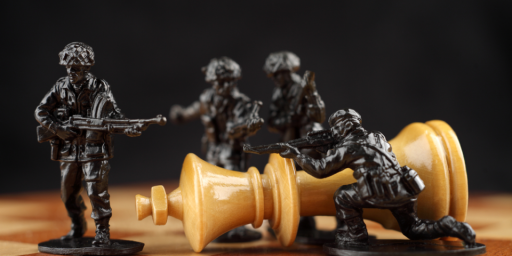Military Education Sought To Be Cut In ‘Stress Periods’
Military Education Sought To Be Cut In ‘Stress Periods’ (UPI)
Defense Secretary Donald H. Rumsfeld has asked the chairman of the Joint Chiefs of Staff to provide options for cutting back military officer education during “stress periods” — such as during the war in Iraq — to allow greater numbers to be available for deployment. At the same time, the Army’s 4th Infantry Division has decided to pull 29 officers out of its 10-month professional education curriculum early to send them to Iraq, said a Feb. 9 memo obtained by United Press International. The 29 officers are being withdrawn a few weeks early from the Command and General Staff College at Fort Leavenworth, Kan., at the request of the commander of the division, who has a critical need for 32 more officers before he deploys to Iraq. The officers will receive full credit for having finished the course, a Pentagon official said.
The college also will give up one instructor to the division for deployment, and two other officers have been identified in the field for the assignment.The move is one more indication that the Army does not have sufficient numbers to fight in Iraq and Afghanistan as well as prepare its officers for future conflict, said Pentagon and congressional sources close to the matter. “We’re so good because of our professional education, and you can’t eliminate it, postpone it or reduce it if you want a professional military,” one senior Army officer said. […] The matter also is raising concerns on Capitol Hill. “You’ve got two missions, as I see it: to fight these wars and prepare for the next war,” said Rep. Ike Skelton, Missouri Democrat. “The golden age of professional military education was the period following World War I. It sustained the Army’s war fighting competency during those lean times and produced the commanders that lead the nation to victory in World War II.
[…]
Another senior defense official defended the proposal to cut back on professional military education, and said the Army is considering rethinking all of its scholarly assignments, such as fellowships. “Some of the experiences they are getting today are better than anything they will get in a classroom,” the official said. “It’s not giving up something for nothing. We have a generation of leaders in the Army today that are battle-tested and are much more capable of leading the Army from the actual experience they have. It’s not an all-or-nothing choice.”
Certainly true. Further, shortening training periods during wartime is hardly unprecedented. Everything from the time spent at West Point to officer basic courses to senior service schools were shortened during World War II, for example.
Still, Skelton is right. Modern military leaders spend roughly a third of their careers in professional training and civilian education for a reason. There’s no doubt that spending a few months in Iraq rebuilding a nation’s infrastructure is an educational experience that is not likely to be duplicated getting an MBA at Wharton, working on a fellowship at Tufts, or working sand tables at Leavenworth. But those experiences offer an things that can’t be gleaned in the field.
Another thing is often missed in such discussions. Aside from the intellectual benefits of these schools, there is the simple fact that they provide a period of relatively stress free down time that allows officers to decompress from the rigors of their careers. This is simply vital in an era, such as we’ve had for more than a decade, where our soldiers are constantly being rotated from one international crisis to another. A few months wearing Class B’s and sitting in a classroom are a very productive way to head off post traumatic stress, save marriages, and recharge the batteries of those who we expect to serve 20-30 years.





Good point about the schools and WWII. OTOH historian Williamson Murray points to that as a factor in the strategic failure in SE Asia. By downplaying formal education, the army leadership was ill-prepared for a limited war outside Europe.